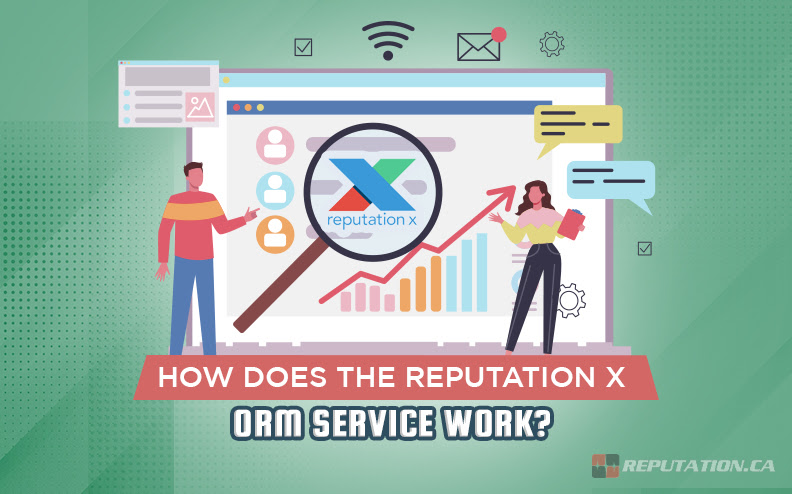Reputation X is a full-service online reputation management company that uses AI-powered tracking technology and actual human experts to help protect and restore online identities. Business owners and people with negative search results online already know that the problem gets worse every day.
They run these advanced tracking systems 24/7 that find mentions of your name or business on sites that most users have never even heard of. They’ve also built their own AI tools that identify problems before they have a chance to spread all over the internet. Their strategy team works on content campaigns that they time just right to exploit the patterns in how search algorithms rank results.
Industrial-level reputation management is different from simple damage control because it pulls together a few strong methods. Legal takedown notices are one part of it. Strategic publication on high-authority domains is another. And then there are the review response protocols that have been set up carefully to work with each platform’s different algorithms. Just one negative result on the first page of Google can cost you business opportunities worth thousands of dollars. Yet it usually takes between 30 and 90 days to suppress that content. The exact timeline depends on how damaging the content is and the domain authority of where it’s posted.
We should probably take a better look at the tracking infrastructure and how it functions behind the scenes.
Here’s how the ORM service works to protect what shows up about you online!
Smart Tools That Monitor Your Business
Reputation X and other ORM services depend on some very strong tracking systems that never actually stop working. These tools have the ability to connect with hundreds of different websites all at the same time through API integrations and automated scanning tools. They always watch search engines, social networks, and review sites. They also monitor news websites and forums for any time someone mentions your name or your brand.
The technology that powers these services has become very advanced over the years. Smart algorithms scan and analyze all the content that crosses their path. And they cast a wide net, too. The systems don’t track your exact name. They also monitor the related keywords, common misspellings, and even the different nicknames or abbreviations that customers might use when they talk about your business.
One of the most helpful features of these tracking tools is that they can pick up on the context behind each mention. The sentiment analysis technology reads through everything to understand if the mention is positive, negative, or just neutral. A casual name drop in some random blog post gets handled very differently than an angry review on Yelp or a damaging story in the local news. The system recognizes these distinctions, and it knows how to respond to each mention.

Most reputation management services concentrate their efforts on the first three to five pages of Google search results. There’s a simple reason for this. Studies are showing that around 75% of users never even bother to scroll past that first page of results. It doesn’t make much sense to spend time and resources watching page ten when practically nobody is ever going to see what’s there.
The alert systems are probably the most helpful feature for day-to-day management. When the tracking tools pick up something that needs attention, they fire off immediate notifications through the customizable dashboards that you can set up any way you want. These dashboards are smart enough to sort the possible threats based on their severity level. A single one-star review might only get marked as moderate priority. But a complaint that starts going viral on social media triggers an urgent alert that needs somebody to jump on it quickly.
Fresh Content That Beats Bad Results
Negative content on Google’s first page can really damage your reputation, and ORM services have developed particular strategies to address this problem. Their main approach is about creating fresh content that performs better in search rankings than the negative results do. The whole point is to move bad results farther down the page and, in the best case, to page 2 or 3, where almost nobody bothers to look anymore.
Press releases and blog posts about your business form the foundation of most ORM campaigns. The trick is that every article has to include the exact keywords and phrases that customers actually type into Google when they search for your company. ORM teams will also build out professional profiles on websites that Google already trusts. Any new content posted there has a much better chance of ranking fast since these sites have built up strong authority over the years.
The challenge with this whole process is that Google has become extremely sophisticated about content quality. The search algorithm actively looks for true expertise and genuine trustworthiness in every article it evaluates. ORM services have learned the hard way that they can’t simply flood the internet with meaningless fluff pieces about their clients anymore. Every article has to give some value to readers.

Experienced ORM teams have figured out which websites Google respects the most in different industries. They’ll prioritize having their content placed on established industry publications and legitimate news sites because these sites already have the reputation and authority that Google values. The content from these trusted sources gets picked up by the algorithm much faster than content from random blogs or unknown websites.
The timeline for seeing real improvements usually runs between 1 and 3 months for most content pieces. ORM services spend this entire period tracking closely where each article sits in the rankings. They’re always checking performance data and adjusting their strategy based on what the algorithm responds to best.
Many services have started building microsites that are dedicated to a client’s brand or personal name. These smaller, focused websites give clients much more control over their search presence than they’d have otherwise. After the right optimization work, these microsites can capture a few positions on that important first page of results, which makes them very valuable for reputation management.
Smart Ways to Handle Customer Reviews
Online review management is about two jobs that need your attention. You have to respond to negative reviews quickly and professionally, and you need to get your happy customers to actually write about their experiences online. Most businesses only worry about damage control, and then they’re confused about why their ratings stay low.
A negative review deserves a careful response since other customers are going to read it. You want to acknowledge that the customer is frustrated without automatically taking the blame for everything. Empathy does help here. But if you accept full responsibility for every complaint that comes your way, it can hurt your business.
The smartest move you can make with heated discussions is to take them out of public view quickly. Post a short public response that thanks the reviewer and asks them to continue the conversation privately. Other customers who see this will know that the business actually cares about fixing problems, and nobody has to watch an uncomfortable argument play out in front of everyone.

Every review platform operates by its own culture and guidelines. Google reviews directly affect where a business shows up in local search results. Yelp enforces very strict policies about soliciting reviews from customers. TripAdvisor’s community expects that you respond to every concern raised. A one-size-fits-all strategy won’t work across these different sites, and I’ve seen plenty of businesses learn this lesson the hard way.
Studies now show that businesses that respond to their reviews can increase conversion rates by as much as 20%. Customers read these replies to see how a business deals with problems. Every response turns into a preview of your customer service before anyone spends a single dollar with you.
Fake reviews occasionally pop up and need formal disputes through each platform’s own channels. Your records matter a lot here. Screenshots, customer records and any evidence that contradicts the reviewer’s claims all help to build a strong case for removal. Most review sites will also remove fraudulent reviews, though the business has to show solid proof first. The entire burden of proving that a review is fake rests squarely on the business owner’s shoulders.
Build Your Trust with Search Engines
Links are actually one of the most valuable parts of any successful ORM service. These services connect all the positive content about your business to websites that Google already knows and trusts. Of course, you can’t simply scatter links everywhere and expect Google to reward you for it. Google’s Penguin algorithm was built specifically to catch and punish websites that depend on fake or low-quality links. What works much better is to develop these connections slowly over time so they appear natural.
Most of the real ORM work happens behind the scenes, where customers never see it. Schema markup is specific code that helps Google figure out what your content actually means. Meta descriptions are those little preview snippets that show up under your link when users search for you. Structured data makes sure your business information shows up correctly across Google’s different search features. These technical elements might sound boring. But they also control how your content looks to customers when they’re looking for you online.

Google has something called Query Deserves Freshness that applies to some kinds of searches. Google tends to favor newer content over content that has been sitting around for a while, particularly for topics that change frequently. ORM services know this and use it to help their clients by keeping positive content about your business updated. Fresh content tells Google that your information is still relevant to users searching right now.
Everything in ORM needs careful calibration and timing. Pushing optimization too aggressively will cause Google’s algorithms to detect that something unnatural is happening. Moving at a snail’s pace lets negative content continue to dominate your search results. The best strategy is to keep a steady and natural-looking growth that builds your web presence bit by bit over time. You want to strengthen your reputation without setting off any of Google’s spam detection systems.
Quick Actions That Stop the Damage
Negative content about you or your business online is a race against the clock, and you have maybe 24 to 48 hours at most to take action on it. Search engines need time to index new content, and that’s why this window matters so much. Most of your customers and contacts probably haven’t stumbled across it at this point, so you still have a chance to control the narrative.
Your first move should be a damage assessment so you understand what you’re actually up against. ORM services will immediately check the source of the content and find out who’s behind it. At the same time, they’re also watching social media to see if the story has legs or if it’s just sitting there quietly. This information determines if you need an emergency response or if you have room to breathe and can plan your next steps carefully.

Legal options are out there if the content crosses particular lines. Copyright infringement is simple because you can file a DMCA takedown request, and websites have to respond. Defamation is harder – you’ll usually need a lawyer to get a court order for removal. European residents have another tool called the Right to Be Forgotten, and it lets them request that search engines delist some personal information from their results.
But legal action can backfire spectacularly. There have been well-known cases where attempts to suppress information only drew massive attention that wouldn’t have existed otherwise. Every ORM professional knows these cautionary tales by heart! That’s why the best firms always bring in PR experts and legal counsel to map out a strategy that solves the problem without amplifying it.
Once you’ve handled the immediate threat, the true challenge is what comes next. Crisis management is the start, and now you need to rebuild and strengthen your reputation online so you’re better protected in the future.
Monitor and Manage Your Reputation
The tracking systems need to work with your content strategies, and your content strategies need to work together with your review management, and everything needs to fit together with your search engine strategies. Each piece is like a gear in a watch – if even one of them starts to fall behind, the whole system loses time. Most business owners have no idea that genuine progress usually takes 6-12 months of steady work. Lots of them give up after just a few weeks when they try everything on their own.
There’s definitely a difference between reputation problems you can handle on your own and the ones that need professional help. A handful of negative reviews from actual customers? Most business owners can address those directly without too much difficulty. It’s a different story when fake reviews start to appear across multiple websites at the same time or when somebody launches a deliberate smear campaign against your company. Professional reputation management teams know just how to handle these bigger situations, and they have the tools and the experience to stop the damage before it destroys your revenue.

The most interesting aspect about this whole process is how much easier everything gets after you push through that first cleanup phase. The first weekend is brutal, no question about it. After that, though, you only need a few minutes here and there to keep it clean. The exact same principle also applies to your online reputation. Once you’ve built the right foundation and put the right systems in place, you can maintain a positive presence almost automatically. You go from always putting out fires to just tending to a well-maintained garden that mostly takes care of itself.
On the subject of building that foundation the right way, if you want to take back control of your online reputation, we’re Canada’s top reputation experts, and we’re ready to work with you. We manage reviews, social media, public relations and crisis response for businesses just like yours. Maybe you have to handle cancel culture fallout, or maybe you just want to build a strong reputation online – either way, we have the exact expertise and experience you need. Contact us at Reputation.ca for expert help that’s designed specifically for your exact situation!







